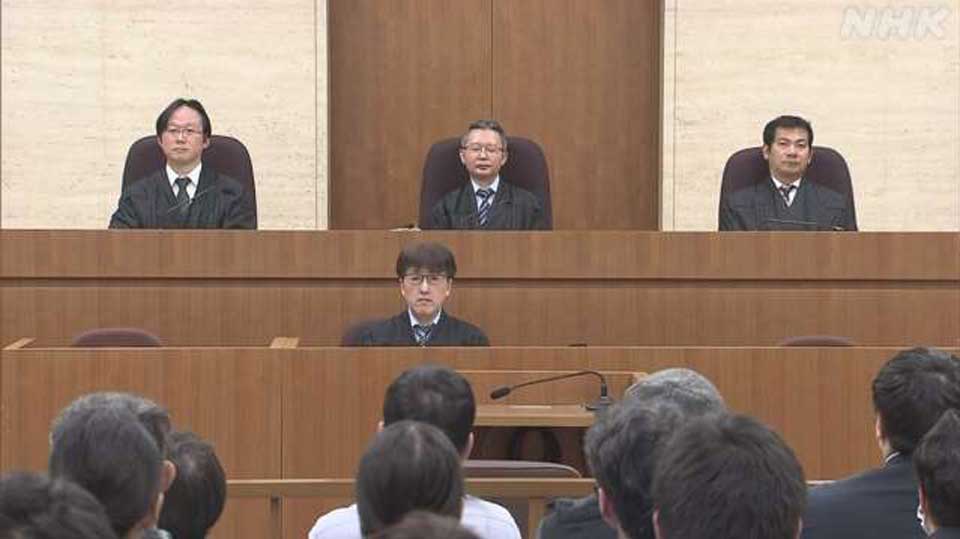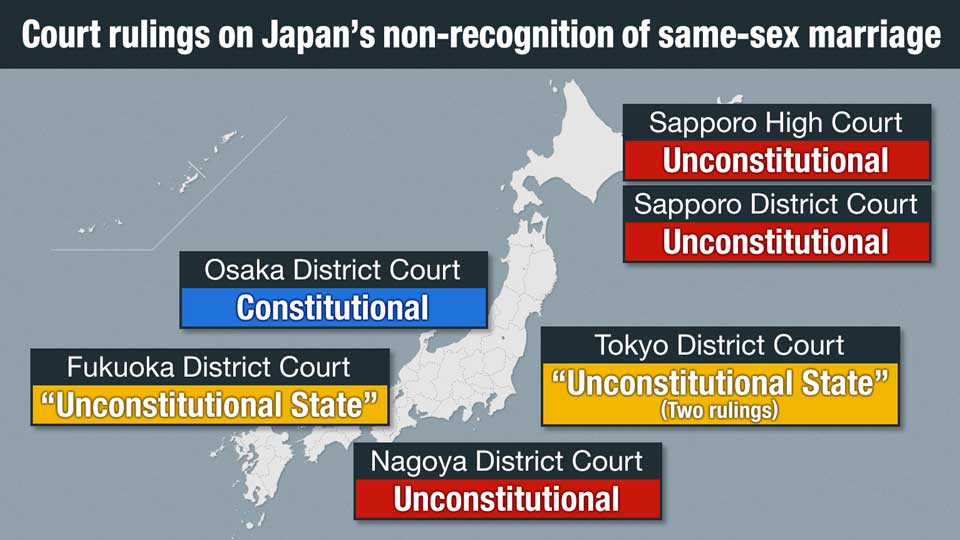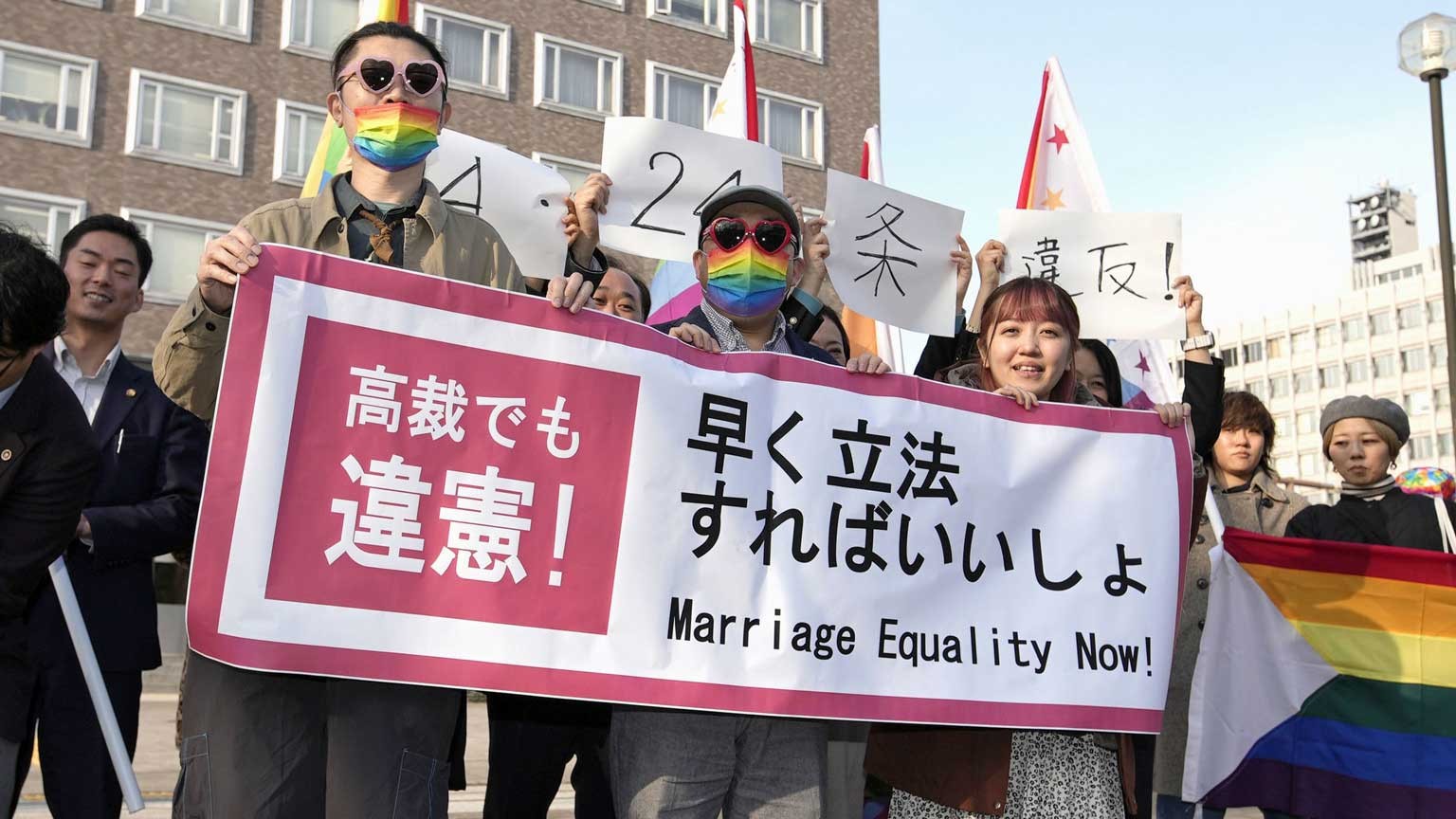The Sapporo High Court issued the ruling on March 14, on a case brought by three same-sex couples in Hokkaido. The plaintiffs had argued that Japan's civil law violates the Constitution by failing to recognize same-sex marriage. They said the Constitution stipulates freedom of marriage as well as equality under the law.

High court: Violation of Article 14 and 24
The ruling marks the first time that an appeals court in Japan has found the lack of legal recognition for same-sex marriage to be unconstitutional.
The decision upheld a 2021 verdict by the Sapporo District Court, which determined that denying same-sex couples the right to marry is discriminatory and violates the Constitution's guarantee of equality under the law. However, the court dismissed the plaintiffs' demands for compensation from the state, prompting them to file an appeal.
During the proceedings at the Sapporo High Court, the plaintiffs argued that there was clear doubt about the rationale for the provisions in the civil law.
In response, the government argued that Article 24 of the Constitution stipulates that "marriage shall be based on the mutual consent of parties of both sexes," and therefore does not include same-sex marriage.
However, presiding judge Saito Kiyofumi said in the ruling that Article 24 can be understood as also guaranteeing marriage between individuals of the same sex. He noted that such couples are currently denied the legal protections and benefits that marriage provides.
Not allowing same-sex couples to marry lacks reasonable grounds, he said, describing it as discriminatory and in violation of the Constitution. However, the court rejected the plaintiffs' claims for compensation. They appealed on March 25 to the Supreme Court.
Court ruling sends out stronger message
The verdict was similar to the one in 2021, but was more strongly phrased. It noted that "a large portion of the public accepts same-sex marriage," and stressed the importance of accepting such changes in society.
"This is fundamentally a matter of dignity, "the ruling continued. "It is hoped that this will be treated as an urgent issue, and that serious discussion and action will be taken as soon as possible."
"The ruling is significant as it clarified that the essence of marriage isn't whether it is between couples of the same or opposite sex, but that it guarantees mutual support between people," said Tanamura Masayuki, a professor at Waseda University's Faculty of Law and an expert on sexual equality issues.

Nearly 400 local governments in Japan have introduced partnership certificates for same-sex couples. But Tanamura said the verdict acknowledges that the disadvantages faced by sexual minorities won't be resolved without allowing them into the framework of the marriage system.
Plaintiff: 'Long-awaited ruling'
Nakaya Eri, one of the plaintiffs, welcomed the "long-awaited" verdict and described it as a potential milestone.
"The ruling gives us hope that same-sex partners will have a right to live just like heterosexual ones as a married couple, as a family," she said tearfully. "And this puts pressure on the Diet to discuss and introduce legislation. I think the ruling will be encouraging for younger minorities, too."

Kunimi Ryosuke (not his real name) said he couldn't hold back tears when he heard the ruling, as it had surpassed his expectations. "I hope every lawmaker will read it and make a sensible decision," he said.
PM Kishida cautious on same-sex marriage
The following day, Prime Minister Kishida Fumio sounded a more cautious note during an Upper House Budget Committee meeting. He reiterated the government's view that the Constitution does not envision recognition of same-sex marriages.
"The government's basic understanding is that the absence of a provision on same-sex marriage doesn't violate the Constitution," Kishida said, adding that he will closely monitor the upcoming decisions in several similar lawsuits.
Series of lawsuits on marriage equality
A total of seven rulings on same-sex marriage have been issued over the past several years, in lawsuits brought by same-sex couples in different parts of Japan. Further cases are pending in Tokyo, Nagoya, Osaka and Fukuoka.

Three of the rulings, including the Sapporo High Court verdict on March 14, have stated that not recognizing same-sex marriage is unconstitutional.
Three other rulings have fallen one step short of this, saying that the lack of legal recognition is in a "state of unconstitutionality." Only one ruling has said it is constitutional.

